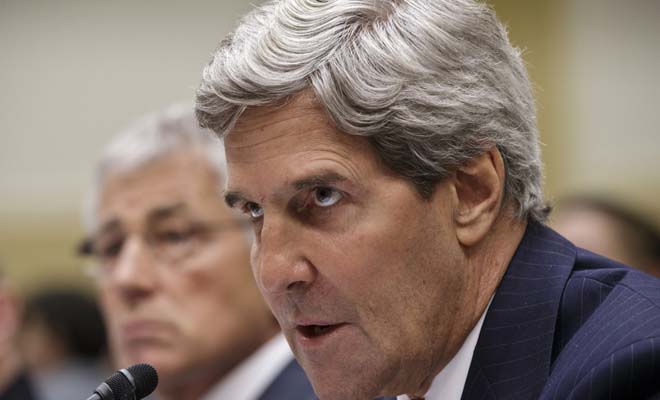Latest: How Significant is the Resignation of an Insurgent Commander?
On the surface, all was cordial during the visit of US Secretary of State John Kerry (pictured) to Saudi Arabia on Monday.
In a statement after the meetings, Prince Saud Al-Faisal, the Saudi Foreign Minister, went through the platitudes of “the historic relations between the Kingdom of Saudi Arabia and the United States of America… based on independence, mutual respect, observation of joint interests, …[and] constructive cooperation as regards the regional and international peace and security issues”.
Prince Saud insisted:
There should be no room for comity of nations as regards real ties between friendly countries. Instead, relations should be based on frankness between the two parties and presentation of viewpoints with the utmost transparency. From this perspective, it is not strange to see
concurrence and differences between any two serious friends who explore
all issues, present their views and seek solutions through continuous
dialogue at all levels with the aim to reach a common vision that would be reflected positively to solve or at least make breakthroughs of thorny issues.
Meanwhile, there was little reference to the divergence between the two countries over support of the insurgency in Syria.
The US and Saudi Arabia — as well as partners in the Gulf, Turkey, Pakistan, and France — had agreed to step up arms supplies and training of opposition fighters, with the view of creating a “national insurgency”.
That mission fell apart, however, when the US hesitated over weapons and then pulled back after the Assad regime’s chemical weapons attacks of August 21, deciding against intervention.
The Saudis persisted, both with continued attempts to deliver arms and with negotiations with France and Gulf States over the “national insurgency”.
We will have more detail this week in a featured analysis.
Meanwhile, Prince Saud — reportedly far more sympathetic to Washington than his father, King Abdullah — tried to deflect any attention from the divergence:
Gossip went far to the extent of describing [our] relations
as deteriorating and passing a critical and dramatic stage.
Such analysis have ignored the historic ties binding the two countries.
Still, without casting any blame on Washington, the Prince did put in one mention of the dispute over Syria: “Squeezing the Syrian crisis to a mere disarmament of chemical weapons has failed to put an end to one of the largest humanitarian crises of our time.”
And, reading between these lines, a message for the Americans can be glimpsed:
I would like to refer to the fact that the Kingdom of Saudi Arabia is well aware of the importance of negotiation as a means of solving a dispute, but at the same time, we suggest that negotiations should not go an endless way, particularly, that we are now facing grave crises that accept no half-solutions. On the contrary, a firm and decisive interference is needed to put an end to the humanitarian tragedies that came out of such problems. Nothing is more indicative than the failure of the world community to stop war against the Syrian people despite the fact that the moral option between war and peace is as clear as the sunshine in a cloud-free day and leaves no room for thinking whether to choose between standing steadfast to stop bloodshed or disregard the whole matter.
There is no difference in our mutually agreed upon goal in Syria….[We] will not stand idly by as [Syrian President Bashar al-] Assad continues to use weapons.
The Secretary of State gave no indication as to what response beyond idleness would be made. Instead, he said:
Absent a negotiated solution we don’t see a lot of ways to end the violence that are implementable or palatable to us, because we don’t have the legal authority, or the justification or the desire at this point to get in the middle of a civil war.
I think that’s been made very, very clear.
Assad Regime Denounces “Desperate” Saudi Arabia
Recognizing Riyadh’s continuing efforts at support for the Syrian insurgency and trying to unsettle the Saudi meeting with US Secretary of State Kerry, Syria’s Information Minister Omran al-Zoubi declared on State TV on Monday that a desperate Saudi Foreign Minister, Prince Saud, would be “unprecedentedly disappointed”.
“We are not going to Geneva [a proposed international conference] to hand power as al-Faisal wishes,” al-Zoubi said:
What is going to happen in Geneva is a political process and not a handover of power or forming a transitional governing body, and those who imagine anything other than that will have to read Geneva Communiqué or they have better not to come to Geneva.
How Significant is the Resignation of an Insurgent Commander?
Chatter continues about Sunday’s resignation of Colonel Abdul Jabbar al-Oqaidi, one of the Free Syrian Army’s most visible commanders, from the Supreme Military Council.
Al-Oqaidi, who was involved in the capture of Mennegh airbase in Aleppo Province this August — one of the insurgency’s most notable victories this year — quit after the fall of the town of as-Safira, also in Aleppo Province, last Friday.
In a resignation video issued Sunday, al-Oqaidi blamed rifts among insurgent faction for the loss of as- Safira. He chided the opposition abroad “for your hotels and your political posts”.
The loss of al-Oqaidi is unlikely to be a major blow to an insurgency which is already a patchwork of brigades and commanders. He had been increasingly detached from the SMC this year, believing it was not effective in its work with the fighters inside Syria, and had effectively become an autonomous officer.
However, his resignation is another blow to the claim of the SMC, the preferred vehicle of Washington and some other countries for the insurgent response, to command forces in the conflict.
That blow in turn reinforces developments in the north such as September’s combination of 13 factions, renouncing the lead of the SMC, in a new bloc.

